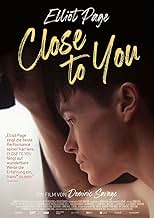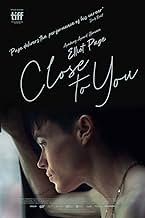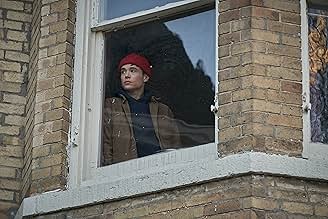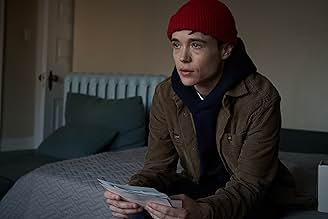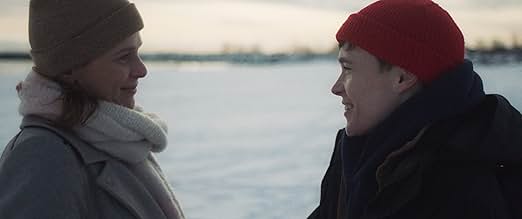NOTE IMDb
5,2/10
1,4 k
MA NOTE
Suivez Sam qui a la chance de rencontrer un vieil ami sur le chemin du retour, à l'occasion d'une réunion de famille redoutée qui l'oblige à affronter des souvenirs enfouis depuis longtemps.Suivez Sam qui a la chance de rencontrer un vieil ami sur le chemin du retour, à l'occasion d'une réunion de famille redoutée qui l'oblige à affronter des souvenirs enfouis depuis longtemps.Suivez Sam qui a la chance de rencontrer un vieil ami sur le chemin du retour, à l'occasion d'une réunion de famille redoutée qui l'oblige à affronter des souvenirs enfouis depuis longtemps.
- Réalisation
- Scénario
- Casting principal
- Récompenses
- 2 victoires et 6 nominations au total
Avis à la une
Wow, talk about lookin' shredded like a Julienne Salad! Elliot Page has been puttin' in some work. Okay, so the movie isn't the greatest, but it certainly deserves a much higher rating than a 4.6. It's an independent film with some good performances with lots of improvised dialogue-and has won a few well deserved awards. On Rotten Tomatoes, 65% of 55 critics' reviews are positive, with an average rating of 6.1/10 where it should be. The website's consensus reads: "A passion project for Elliot Page that benefits from his naturalism." So, what's with all the low ratings? Give it a shot, it gets better as it progresses.
Sam has left home - the small town of Coburg - moved to Toronto, and has transitioned from female to male. He now takes a trip home - the 1st in 4 years. On the train, he happens to meet Katherine, his best friend from high school.
The reason for the return is his father's birthday party, which allows the writers to populate the family with a selection of attitudes about the transition. His father is mostly relieved that Sam has found himself, and is no longer in pain. His mother will always remember him as her little girl, consistently misgenders him (not necessarily maliciously), and is concerned about his well-being, compared to his sister who stayed in Coburg and got married. His sister wonders why he never confided in her, when they shared a bedroom growing up. And his brother-in-law is transphobic.
Escaping the family, Sam seeks solace with Katherine.
This is a Elliot Page vehicle, inspired by his life. The direction allows him to casually show off his boy bod. This answers the question "where are they now"? However, after this autobiographical-inspired story, I am wondering what other projects he will appear in.
Using available-light photography lost one star by me. Too often, the subjects were shot with a background of a bright window, making it to hard to see facial expressions.
The reason for the return is his father's birthday party, which allows the writers to populate the family with a selection of attitudes about the transition. His father is mostly relieved that Sam has found himself, and is no longer in pain. His mother will always remember him as her little girl, consistently misgenders him (not necessarily maliciously), and is concerned about his well-being, compared to his sister who stayed in Coburg and got married. His sister wonders why he never confided in her, when they shared a bedroom growing up. And his brother-in-law is transphobic.
Escaping the family, Sam seeks solace with Katherine.
This is a Elliot Page vehicle, inspired by his life. The direction allows him to casually show off his boy bod. This answers the question "where are they now"? However, after this autobiographical-inspired story, I am wondering what other projects he will appear in.
Using available-light photography lost one star by me. Too often, the subjects were shot with a background of a bright window, making it to hard to see facial expressions.
It's a trans child negotiating his family relationship drama set over several days in present-day Toronto and Cobourg, Ontario, Canada. Sam (Elliot Page) is a trans male who transitioned from female, probably in his early 20s. He lives and works in Toronto and rooms in a house owned by Emily (Sook-Yin Lee). Sam has not seen his family for five years. Still, he has decided to go home to Cobourg, 95 kilometers east of Toronto along Lake Ontario, to help celebrate his father Jim's (Peter Outerbridge) birthday with the rest of the family.
The movie follows Sam's train ride to Cobourg, on which he meets his old high school flame, Katherine (Hillary Baack), who is now married with children in Cobourg. Two parallel stories unfold, one follows Sam's encounters with his family, including his mother (Wendy Crewson), two sisters (Janet Porter and Alex Paxton-Beesley), brother, Michael (Daniel Maslany), and the two sisters' partners (Andrew Bushell and David Reale). The second follows Sam's efforts to reconnect with Katherine.
"Close to You" is dark and filled with uncomfortable conversations. Sam's relationships with different family members vary and end in crisis. The yearning for understanding and acceptance amidst discomfort is powerfully portrayed. Sam's relationship with Katherine is also complex and is not as well explored, partly because she is deaf. That story leaves many unanswered questions. The film's cinematography is intimate and doesn't always work, sometimes feeling like it drags. Elliot Page is outstanding. My ears had trouble understanding Hillary Baack at times. The various Cobourg family members' characterizations are well-done and varied.
"Close to You" gets an extra point for an insightful portrayal of a challenging subject.
The movie follows Sam's train ride to Cobourg, on which he meets his old high school flame, Katherine (Hillary Baack), who is now married with children in Cobourg. Two parallel stories unfold, one follows Sam's encounters with his family, including his mother (Wendy Crewson), two sisters (Janet Porter and Alex Paxton-Beesley), brother, Michael (Daniel Maslany), and the two sisters' partners (Andrew Bushell and David Reale). The second follows Sam's efforts to reconnect with Katherine.
"Close to You" is dark and filled with uncomfortable conversations. Sam's relationships with different family members vary and end in crisis. The yearning for understanding and acceptance amidst discomfort is powerfully portrayed. Sam's relationship with Katherine is also complex and is not as well explored, partly because she is deaf. That story leaves many unanswered questions. The film's cinematography is intimate and doesn't always work, sometimes feeling like it drags. Elliot Page is outstanding. My ears had trouble understanding Hillary Baack at times. The various Cobourg family members' characterizations are well-done and varied.
"Close to You" gets an extra point for an insightful portrayal of a challenging subject.
This piece is such an important milestone for the trans community. Those who claim the plot has left something to be desired have a fundamental misunderstanding of the point: the lived experience of a trans person. Anyone who has transitioned (or has wanted to and decided not to) will understand what this film was truly about. It will hit home in a way no other media can. We are all different, but our shared experiences bond us all together. The pain of a family who doesn't understand, who lay their own struggles with your identity at your feet and expect you to comfort them. The longing to be seen as who you really are, and the unprecedented joy you experience when someone you love finally does. The knife in your gut when you get misgendered. The strange sensation of being back in a place that has only ever known the old "you".
I can understand how someone who hasn't lived this would not be able to pick up on the emotional nuance. However, it's disappointing to see how low this rating is because too many people who can't comprehend it have weighed in. This feels like a classic turn of events in the trans (and queer) community. So grateful to Elliot and the team who made this.
I can understand how someone who hasn't lived this would not be able to pick up on the emotional nuance. However, it's disappointing to see how low this rating is because too many people who can't comprehend it have weighed in. This feels like a classic turn of events in the trans (and queer) community. So grateful to Elliot and the team who made this.
I really wanted to like Close to You, especially given the talent involved, including Elliot Page, but unfortunately, the film left me feeling underwhelmed. While it has some strong individual elements, they never quite come together to form a compelling, cohesive narrative.
The cinematography is beautiful, and the camera work captures the intimate moments well. The music also stands out-calming, evocative, and a perfect complement to the film's quieter, introspective moments. It's clear the filmmakers put a lot of effort into the aesthetics and atmosphere, and I appreciated that.
As for the performances, Elliot Page delivers a solid portrayal of their character, and many of the actors did their best with the material. The characters themselves are generally likable, but I never felt fully invested in their arcs. The writing, unfortunately, feels lackluster. The dialogue doesn't engage the audience or create the emotional depth needed to elevate the story. It's not that the film is overly slow, but it lacks a strong narrative drive. I can appreciate a slower-paced movie, but the plot here is sparse, and the film doesn't provide enough stakes or development to keep things interesting.
The movie revolves around the protagonist returning home, reconnecting with family, and re-engaging with an old girlfriend. But the family dynamic-while realistic-feels disjointed and drawn-out. For a good portion of the film, we watch the protagonist's family argue and struggle with unresolved issues, and I couldn't help but feel that these sequences dragged on unnecessarily. The family drama is there for a reason, but I found myself wishing the film had focused more on the central relationship, especially the connection with the old girlfriend. I would have preferred a more focused plot, where the protagonist attends some kind of reunion or gathering that leads to rekindling a romance. The family conflict could have been trimmed down or explored in a more meaningful way.
I understand that this film touches on themes of identity, acceptance, and the complexities of family dynamics, particularly around transgender issues. However, I feel the movie relies too heavily on the tension of the protagonist's identity and the discomfort it causes among family members. We've seen these types of conflicts before, and while they are important and real, they can feel repetitive if not handled in an innovative or engaging way. At some point, I wanted to see more of the protagonist's life beyond the familial drama-more exploration of love, relationships, and self-discovery, without always focusing on the external conflict of transphobia or familial rejection. It's a vital part of the narrative, but I think we need to move beyond these plot points and engage with the characters as complex, multifaceted individuals, not just as symbols of societal issues.
In the end, Close to You feels like it's stuck between wanting to be a deeply personal story about love and identity, and a more conventional family drama. But it doesn't fully commit to either. The movie lacks the narrative depth and emotional resonance needed to make it truly impactful. It's a shame because the potential was there-the performances, the direction, and the music all had promise-but the script and structure fail to tie everything together in a way that feels satisfying.
Ultimately, I think this film missed an opportunity to create something truly special. If it had focused more on the relationship dynamics and less on the drawn-out family conflict, it could have been a much stronger, more engaging story. As it stands, Close to You feels like a missed chance to tell a richer, more engaging narrative about love, identity, and human connection.
The cinematography is beautiful, and the camera work captures the intimate moments well. The music also stands out-calming, evocative, and a perfect complement to the film's quieter, introspective moments. It's clear the filmmakers put a lot of effort into the aesthetics and atmosphere, and I appreciated that.
As for the performances, Elliot Page delivers a solid portrayal of their character, and many of the actors did their best with the material. The characters themselves are generally likable, but I never felt fully invested in their arcs. The writing, unfortunately, feels lackluster. The dialogue doesn't engage the audience or create the emotional depth needed to elevate the story. It's not that the film is overly slow, but it lacks a strong narrative drive. I can appreciate a slower-paced movie, but the plot here is sparse, and the film doesn't provide enough stakes or development to keep things interesting.
The movie revolves around the protagonist returning home, reconnecting with family, and re-engaging with an old girlfriend. But the family dynamic-while realistic-feels disjointed and drawn-out. For a good portion of the film, we watch the protagonist's family argue and struggle with unresolved issues, and I couldn't help but feel that these sequences dragged on unnecessarily. The family drama is there for a reason, but I found myself wishing the film had focused more on the central relationship, especially the connection with the old girlfriend. I would have preferred a more focused plot, where the protagonist attends some kind of reunion or gathering that leads to rekindling a romance. The family conflict could have been trimmed down or explored in a more meaningful way.
I understand that this film touches on themes of identity, acceptance, and the complexities of family dynamics, particularly around transgender issues. However, I feel the movie relies too heavily on the tension of the protagonist's identity and the discomfort it causes among family members. We've seen these types of conflicts before, and while they are important and real, they can feel repetitive if not handled in an innovative or engaging way. At some point, I wanted to see more of the protagonist's life beyond the familial drama-more exploration of love, relationships, and self-discovery, without always focusing on the external conflict of transphobia or familial rejection. It's a vital part of the narrative, but I think we need to move beyond these plot points and engage with the characters as complex, multifaceted individuals, not just as symbols of societal issues.
In the end, Close to You feels like it's stuck between wanting to be a deeply personal story about love and identity, and a more conventional family drama. But it doesn't fully commit to either. The movie lacks the narrative depth and emotional resonance needed to make it truly impactful. It's a shame because the potential was there-the performances, the direction, and the music all had promise-but the script and structure fail to tie everything together in a way that feels satisfying.
Ultimately, I think this film missed an opportunity to create something truly special. If it had focused more on the relationship dynamics and less on the drawn-out family conflict, it could have been a much stronger, more engaging story. As it stands, Close to You feels like a missed chance to tell a richer, more engaging narrative about love, identity, and human connection.
Le saviez-vous
- AnecdotesThe movie's dialog is mostly improvised following a written script outline.
Meilleurs choix
Connectez-vous pour évaluer et suivre la liste de favoris afin de recevoir des recommandations personnalisées
- How long is Close to You?Alimenté par Alexa
Détails
- Date de sortie
- Pays d’origine
- Site officiel
- Langues
- Aussi connu sous le nom de
- Cerca de ti
- Sociétés de production
- Voir plus de crédits d'entreprise sur IMDbPro
Box-office
- Montant brut aux États-Unis et au Canada
- 68 389 $US
- Week-end de sortie aux États-Unis et au Canada
- 39 073 $US
- 18 août 2024
- Montant brut mondial
- 72 992 $US
- Durée
- 1h 40min(100 min)
- Couleur
Contribuer à cette page
Suggérer une modification ou ajouter du contenu manquant




